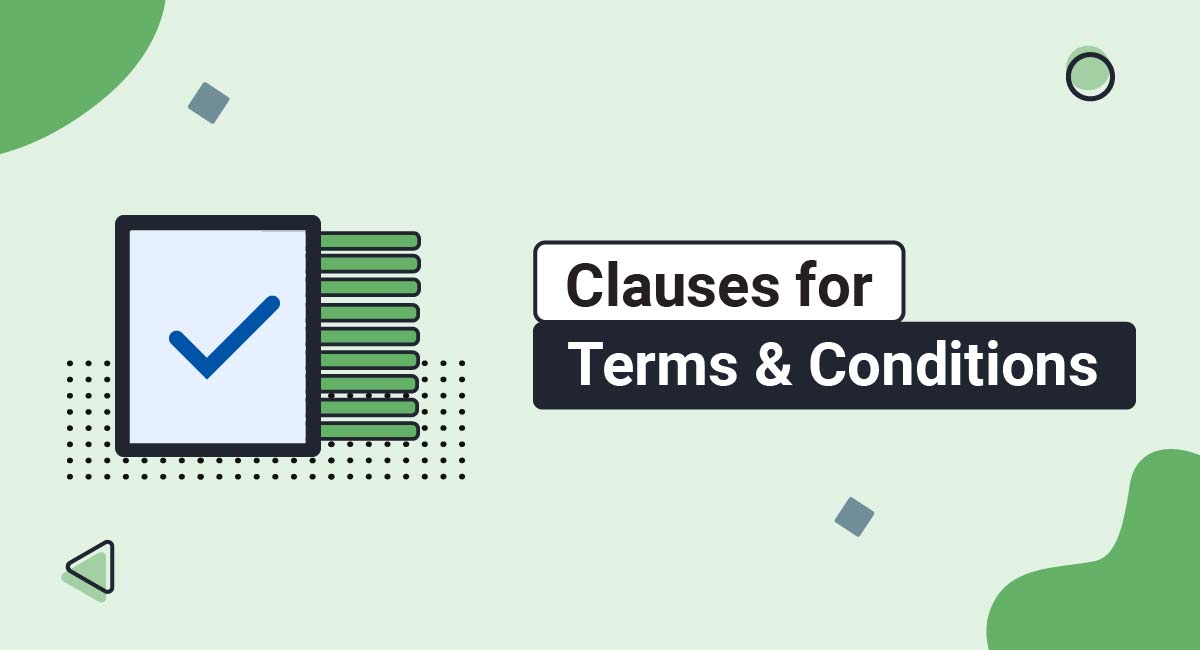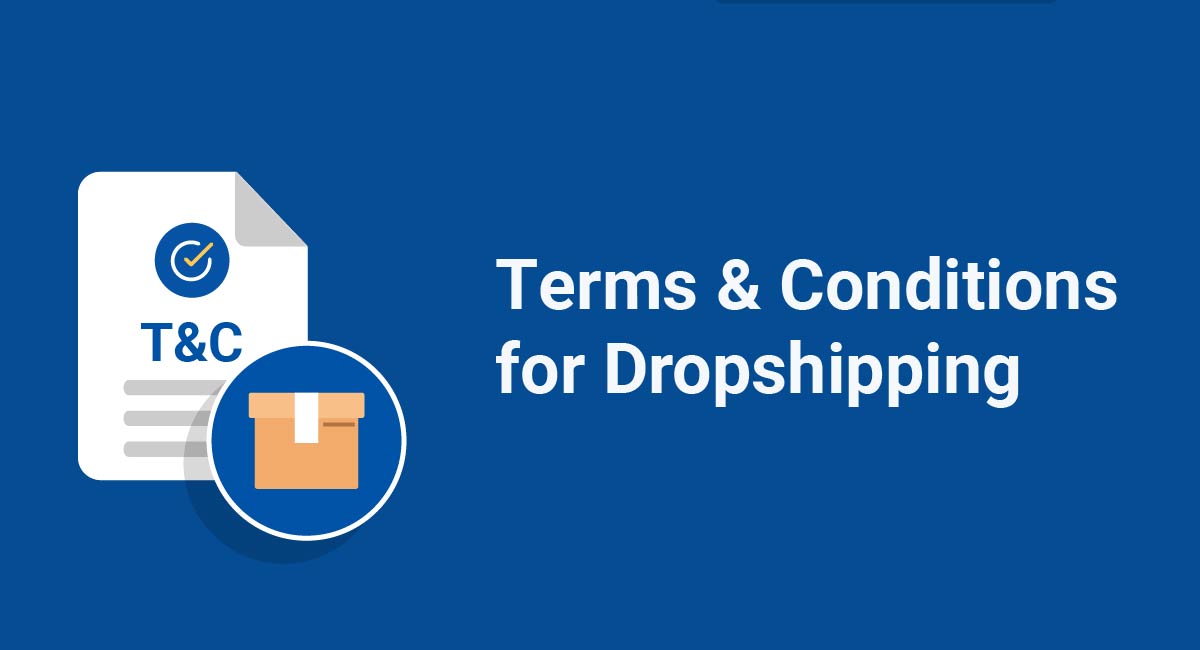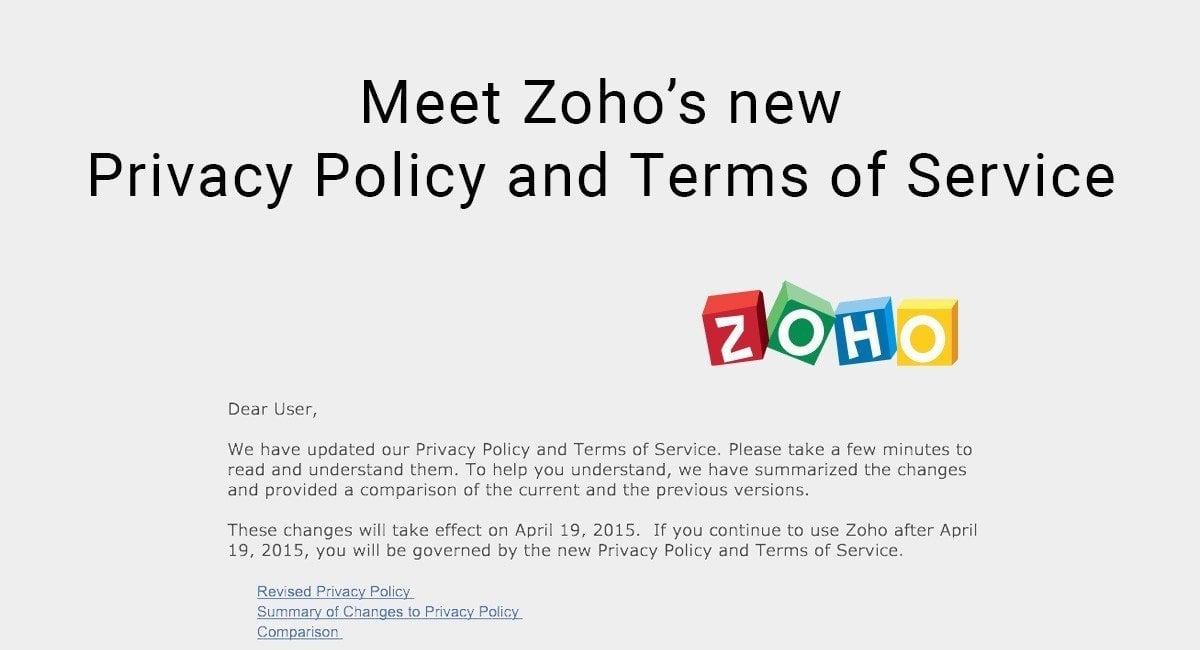Your Terms & Conditions (T&C), can be called Terms of Use or Terms of Service, but no matter the title of your agreement, this agreement contains all the rules between you and the users who are using your website or app.
You want your Terms & Conditions agreement to be complete so you can protect your company from liability and prevent the misuse of your website or mobile app.
Here are the essential clauses you need for your Terms & Conditions agreement.
Our Terms and Conditions Generator makes it easy to create a Terms and Conditions agreement for your business. Just follow these steps:
-
At Step 1, select the Website option or the App option or both.
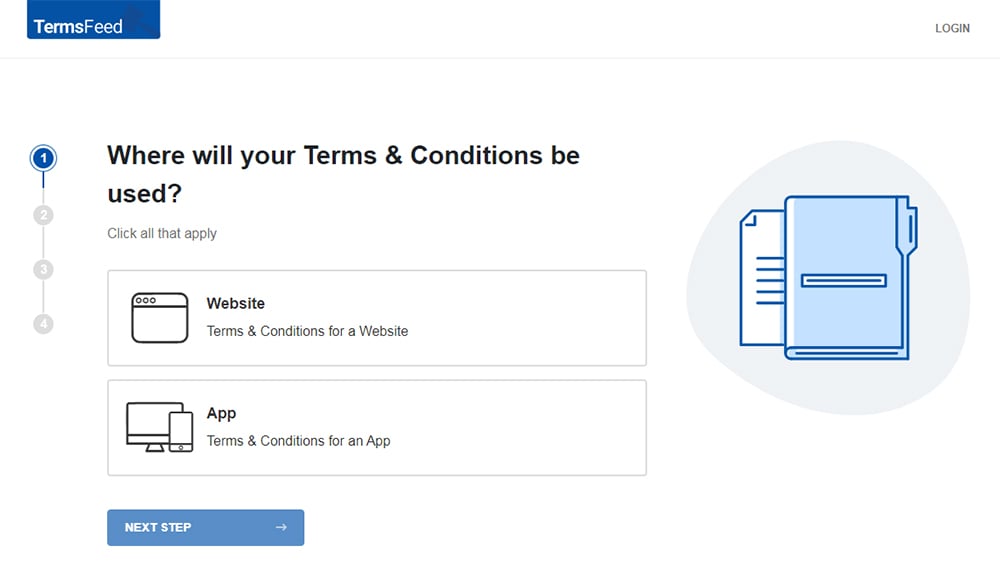
-
Answer some questions about your website or app.
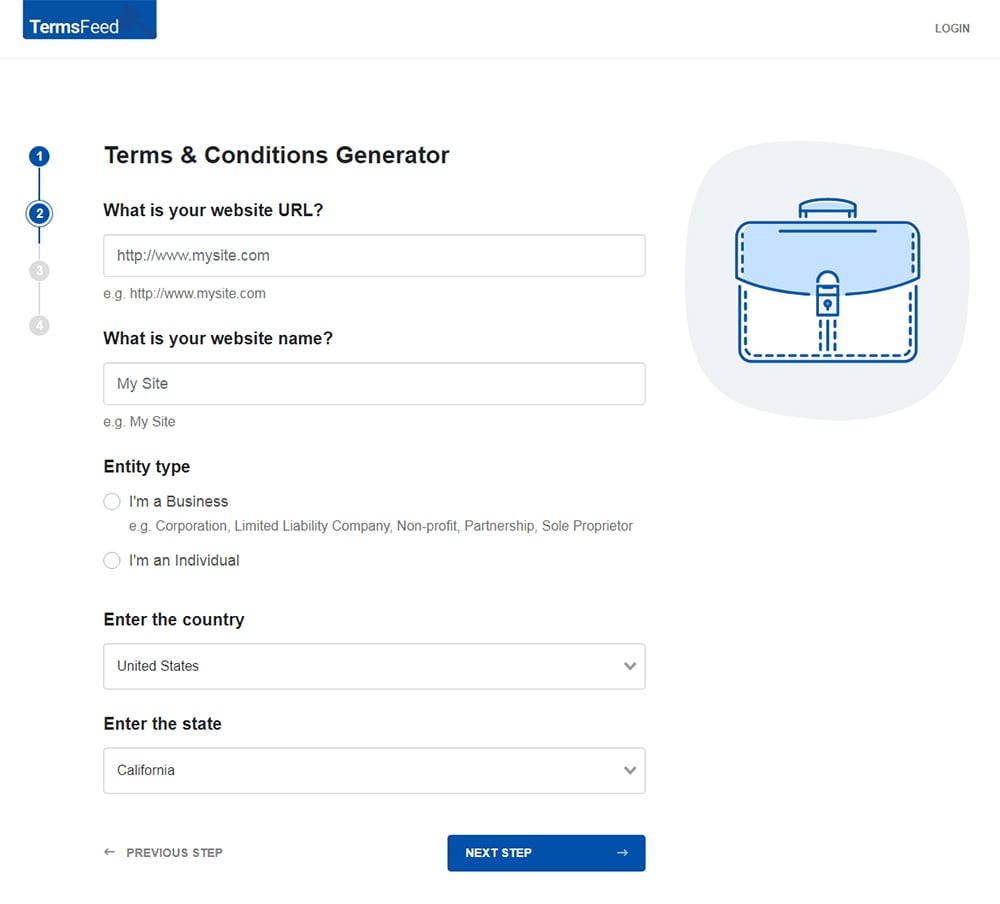
-
Answer some questions about your business.
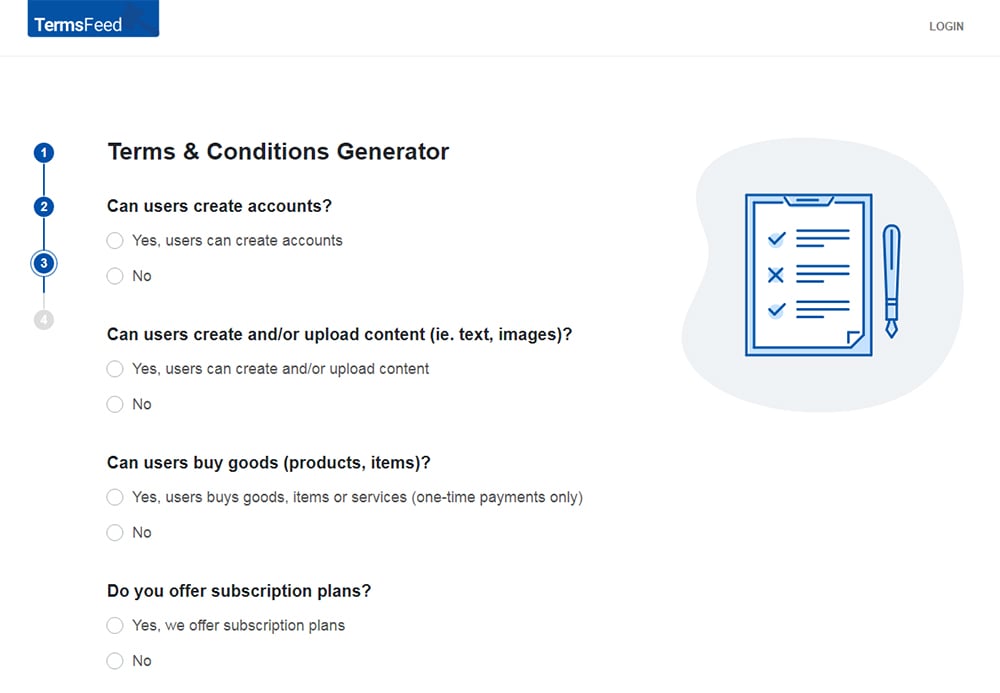
-
Enter the email address where you'd like the T&C delivered and click "Generate."
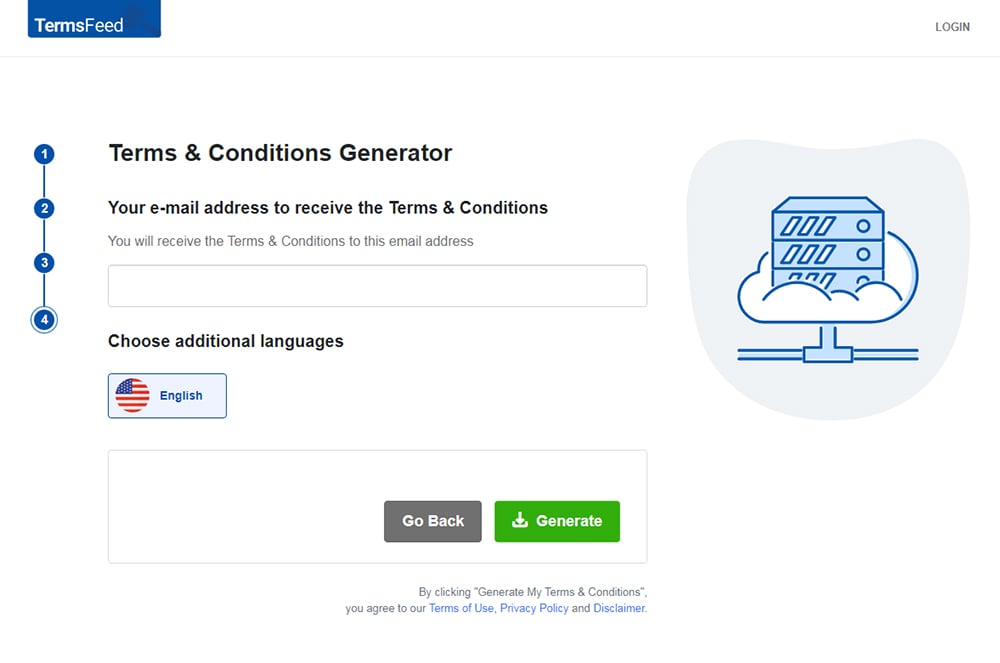
You'll be able to instantly access and download the Terms & Conditions agreement.
- 1. Clause 1: Acceptance of Terms
- 2. Clause 2: Reference to Privacy Policy
- 3. Clause 3: Authorized Users
- 4. Clause 4: User Submissions
- 5. Clause 5: Payments and Billing
- 6. Clause 6: Copyright Infringement
- 7. Clause 7: Disclaimers and Warranties
- 8. Clause 8: Intellectual Property Rights
- 9. Clause 9: Applicable Law
- 10. Clause 10: Termination of use
- 11. Clause 11: Changes to Terms
Clause 1: Acceptance of Terms
Your Terms & Conditions agreement is not enforceable unless the user accepts the agreement.
This often occurs through clickwrap or browsewrap. You can dictate additional terms regarding acceptance through the "Acceptance of terms" clause.
The popular North American streaming service, Netflix, explains that its Terms of Use agreement, Privacy Policy, and EULA agreements are accepted when a user visits or uses the Netflix site or app:

It's not unusual for a Terms & Conditions agreement to also indicate that use of the website or app creates acceptance. This is called browsewrap, but clickwrap is more enforceable.
Clause 2: Reference to Privacy Policy
The Terms & Conditions are the ground rules of use for your website and app, so it's a good practice to integrate and reference your other policies and legal agreements, such as Privacy Policy, Cookies Policy or others.
Including references to your other legal agreements doesn't need to be a long section.
Business Insider UK adds this with a quick reference and a link:

Netflix takes a different approach and keeps it very brief:
![]()
Like with other clauses that refer to or integrate your other legal agreements, provide links to those agreements.
Business Insider adopts this practice and Netflix's paragraph 3 does not have a link, but that's likely due to the fact there's a clear link to the Privacy Policy of Netflix just two paragraphs up.
Clause 3: Authorized Users
The "Authorized users" clause for your Terms & Conditions is usually only necessary if you want to limit access to your website or app somehow.
One example of where this kind of clause is important is dating websites. Since laws can be very strict about adults corresponding with minors, the age limitation is a legal protection.
OKCupid makes this very clear in its Terms & Conditions agreement:

While OKCupid has a blanket rule about who can use its website and app, Pandora adapts the age limit rule according to jurisdiction.
In its Terms of Use agreement, the minimum age to use Pandora independently is 18. If your user is a minor, the minimum age is 15 for those living in Australia and 13 everywhere else - providing they have parental consent:

Depending on your business, you may wish to restrict access to users age 18 and over, just to make this easy.
Clause 4: User Submissions
A "User Submissions" clause in your Terms & Conditions agreement is only relevant for websites and apps that encourage user-generated content.
For example, if your business is a photo sharing app, you'll need to address user submissions and potential copyright issues.
Generally, in the "User Submissions" section you explain that your business doesn't own the user-generated content and any submitted content must belong to the users submitting the content - or at least the user secures authorization from the content owner to submit the material.
Once the content submitted, the business gains a non-exclusive license. There's also a disclaimer indicating that users access user-generated content at their own risk.
Vox Media contains a detailed "User Submissions" section in its Terms of Use page:
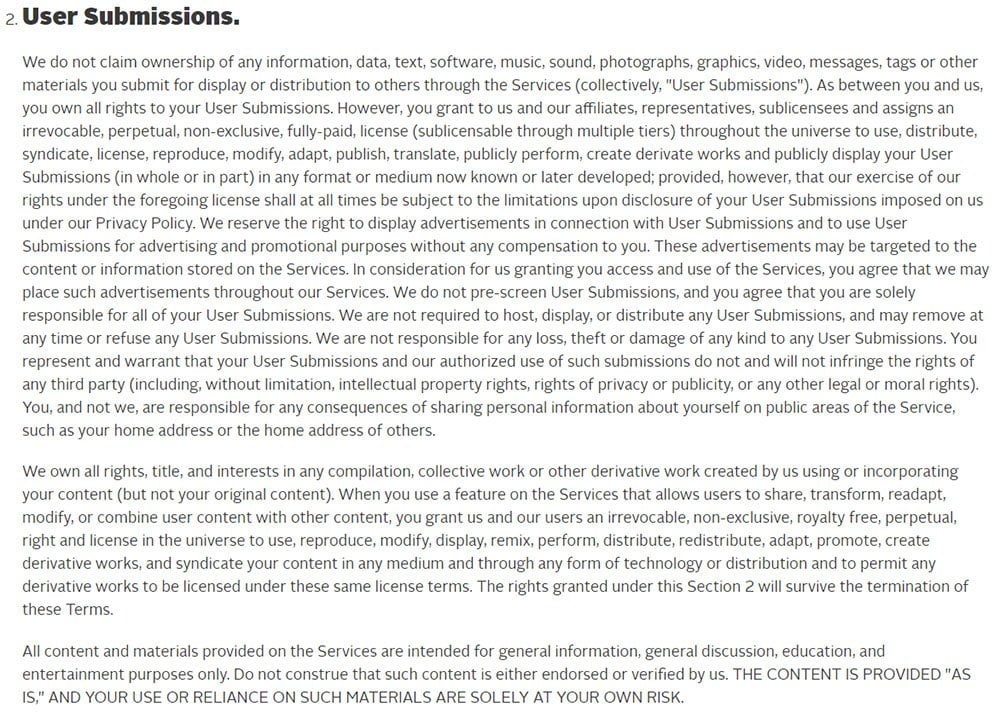
Clause 5: Payments and Billing
Websites or apps with paid services, memberships, and subscription plans must contain billing and payment terms in their Terms & Conditions agreement.
Skipping a "Payments and Billing" section in the Terms & Conditions agreement could make it difficult for your business to collect on due accounts or demand payment in the first place.
Business Insider UK has few paid services. Its Terms of Use agreement covers the terms of paid services in a brief paragraph (with references to the Subscription Agreement) just in case a user upgrades to the paid services:
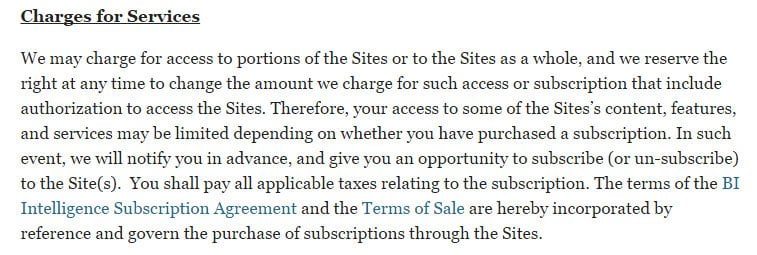
A car-sharing service like car2Go offers membership levels and different payments plans. It must go deeper into describing billing methods.
This is what it does in its "Billing" clause in its Terms & Conditions agreement:
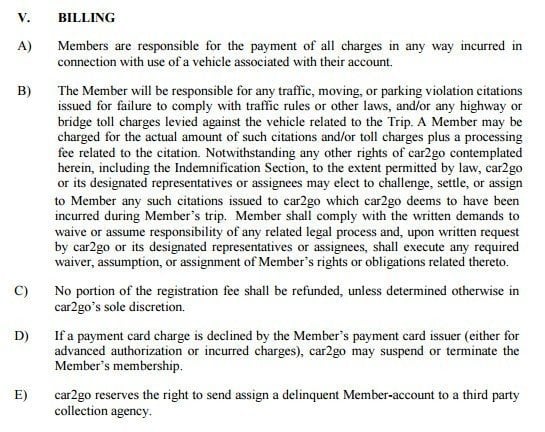
If you don't charge for services or products through your website or app, you most likely won't need this clause.
Clause 6: Copyright Infringement
When your website or app allows user-generated content or the sharing of content, you're required to provide a means to report copyright infringement. You can include information about this through a "Copyright Infringement" clause in your Terms & Conditions.
In the U.S., the Digital Millennium Copyright Act (DMCA) contains provisions that can hold businesses liable for copyright infringement even if the business wasn't responsible for the content.
You can avoid this liability by providing a process for third parties to report violations.
Vox Media explains that it removes media that violates copyright law. It also provides a mailing address and email address to report copyright violations in case they get by their system protections.
There's also a description of what to include in that notice:
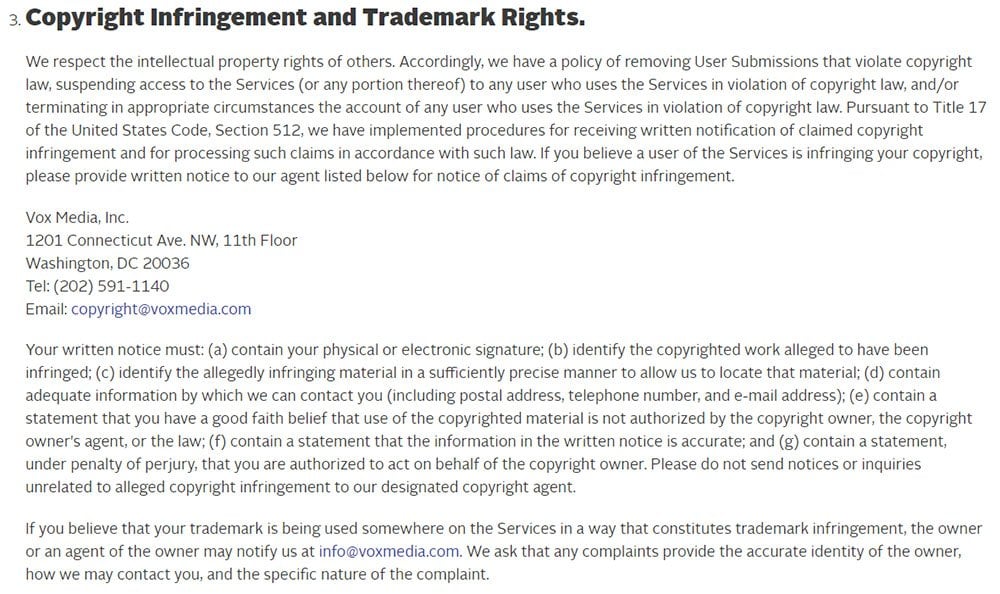
Even if you monitor content carefully and believe copyright infringement is impossible, you should still include the DMCA or Copyright Violations information in your Terms & Conditions agreement anyway.
Clause 7: Disclaimers and Warranties
Without a "Disclaimers and warranties" in your Terms & Conditions, your business could technically face liability for brief periods when your website or app is not accessible.
The same is true if viruses that infect your website also infect your users' computers and mobile devices.
A disclaimer of liability could protect your company against these instances.
The Guardian includes these clauses in a section disclaiming liability from online attacks, website shutdowns, and other contingencies beyond its control:
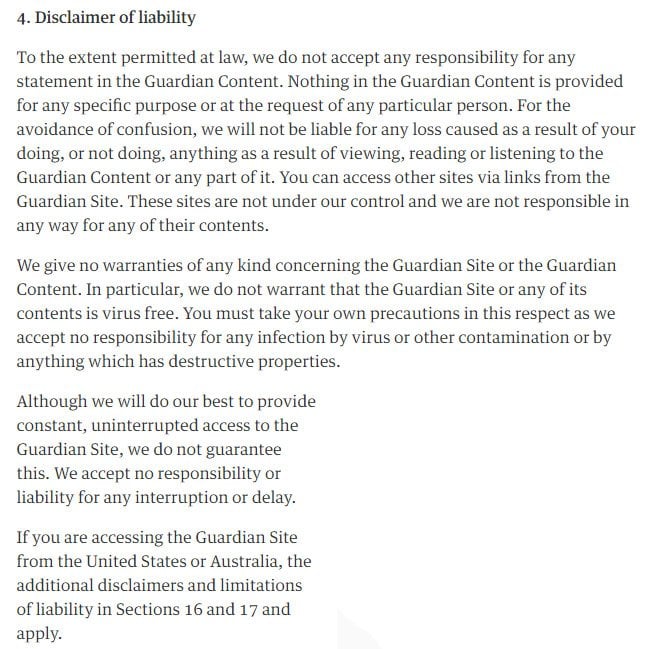
Other websites use general warranty disclaimers.
Often presented in all-caps, this example from the Terms & Conditions of OKCupid shows the usual boilerplate language in these disclaimers:
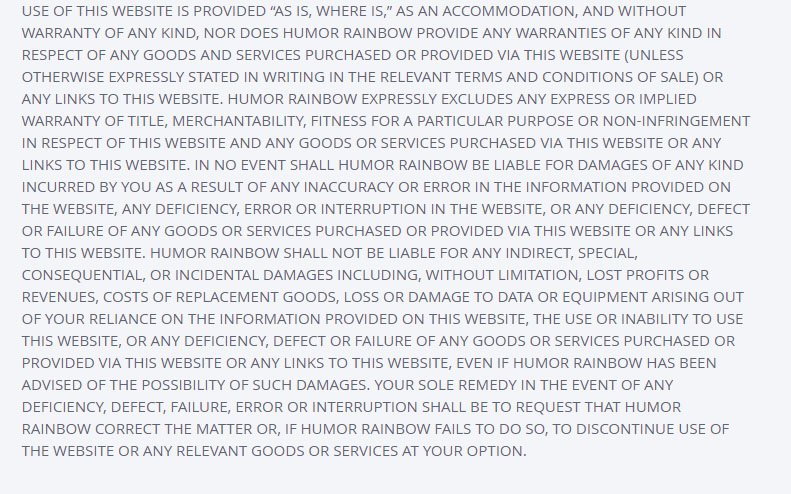
Clause 8: Intellectual Property Rights
Unlike the DMCA clause, the "Intellectual Property Rights" clause in the Terms & Conditions agreement addresses the intellectual property that belongs to you.
Your business copyrights, trademarks, and proprietary information is all legally protected and this kind of section informs users that they are not allowed to use it. This is important because it's easy for users to download your logo or graphics with one right-click of a mouse.
A clause on intellectual property informs users that they are not allowed to use your property.
Business Inside UK addresses this effectively in a section titled "Intellectual Property Rights":
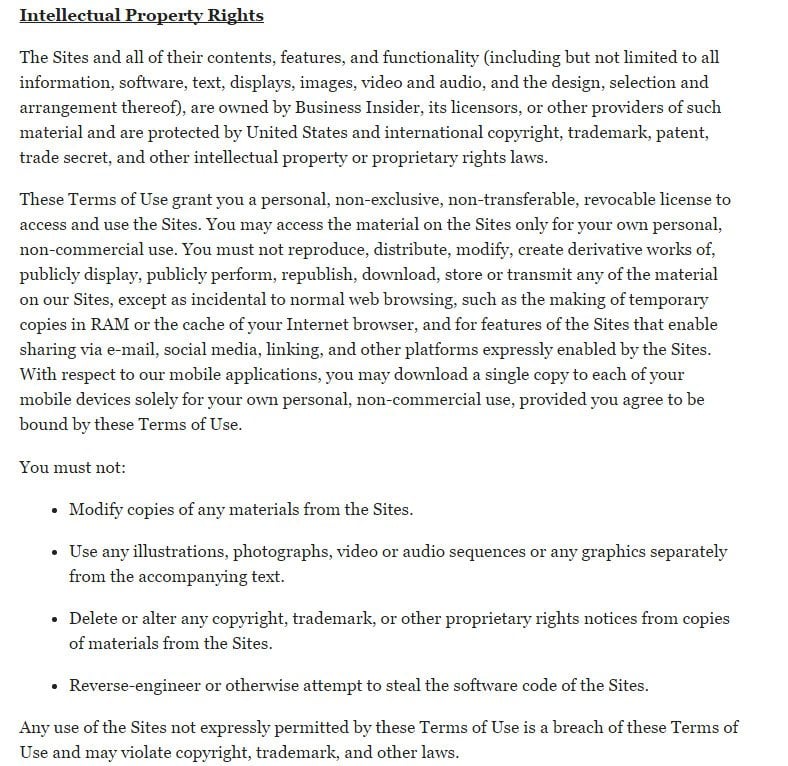
Clause 9: Applicable Law
The "Applicable Law" clause in your Terms & Conditions agreement informs what jurisdiction applies when it comes to disputes and the terms of the legal agreement.
RLJ Entertainment manages streaming services like Acorn TV. While it provides access to several British programs, its head office is in Los Angeles. In its Terms of Usage agreement, it indicates the laws of California are controlling in disputes:

Clause 10: Termination of use
Your Terms & Conditions agreement is there to protect your business and one way you can enforce it is by terminating access to abusive users through a "Termination" clause.
This clause is often included to reduce liability. Users can also voluntarily terminate their accounts and that will end their obligation to your Terms & Conditions.
The "Termination" clause explains how to voluntarily delete a user account but also circumstances where you will unilaterally terminate a user account. You can also add a description of how users will be notified of termination.
Twitter has a "Termination" clause in its Terms of Service agreement:

If you include instructions for terminating user accounts, also provide a link to your Privacy Policy so users know what happens to their data once their account is deleted.
Clause 11: Changes to Terms
Through a "Changes to Terms" or "Amendments" clause you have a way to inform users when the Terms & Conditions agreement is changed.
Most businesses choose to notify users by email or through banner announcements placed through their websites.
You not only want to include how you announce changes to the agreement but also that you have the right to change the Terms & Conditions when necessary.
This may seem like an obvious thing to you, but your business could face liability if a user expected the Terms & Conditions would never change and then you introduce new terms in the future.
Twitter offers this example in its own agreement:

Its "Changes to Terms" clause mentions that acceptance by users is automatic with the continued use of the Twitter website or apps after users are notified of any material changes.

Comprehensive compliance starts with a Privacy Policy.
Comply with the law with our agreements, policies, and consent banners. Everything is included.
